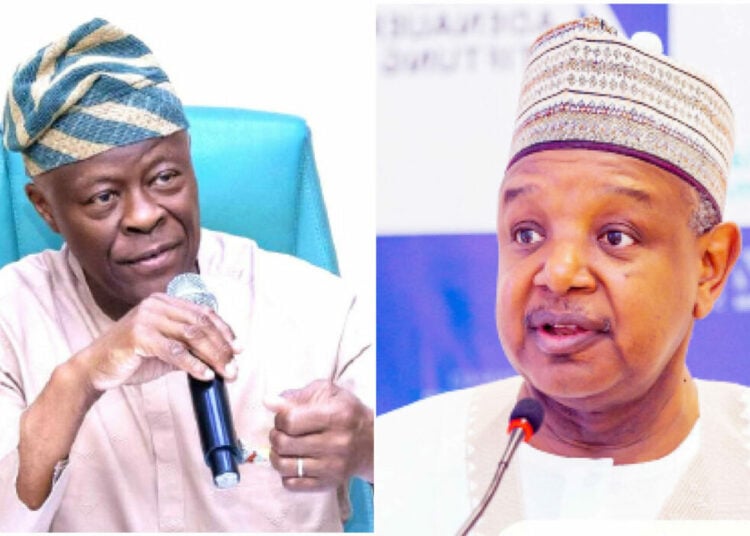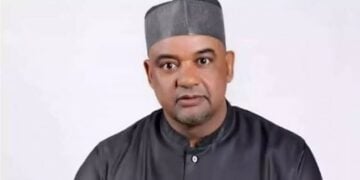Eight months into 2025, the federal government has yet to implement the capital component of the national budget, a development that has triggered concern among economists and policy experts over its implications for fiscal discipline, poverty reduction, and infrastructure delivery.
The delayed budget sensitisation and delayed implementation of the capital component of the national budget have elicited urgent calls from economists and labour groups for significant reforms.
The delay comes amidst government directives that no Ministry, Department or Agency (MDA) should award contracts without prior approval from the Minister of Finance and Coordinating Minister of the Economy, Wale Edun, a measure many say would make issues worse for the capital budget implementation process.
Experts warn that the delayed take-off of the capital budget could dampen growth prospects, increase costs, and weaken confidence in Nigeria’s fiscal system.
The chief economist at SPM Professionals, Dr. Paul Alaje, described the delay as “alarming,” especially since MDAs were only just receiving sensitisation on capital project implementation as August draws close.
“The delay or inconsistency in the budget cycle has its own implications,” Alaje said. “One is price variation, because the key economic rates at the time of submission are not the same when projects are rolled over. Inflation is an annual effect. As we speak, inflation is over 21 per cent. Cement prices today are not what they were when budget proposals were submitted. That has a negative effect on the economy.”
He warned that the continuous rollover of unimplemented budgets, as seen in 2024, undermines fiscal credibility and worsens inflationary pressures. “When budgets are delayed, those who could have been lifted out of poverty remain trapped. By the time payments are eventually made, the expected positive impact is lost,” he explained.
Alaje also called for reforms to improve disbursement efficiency, urging the government to adopt digital platforms for capital expenditure releases and budget processes. “The world has moved on. We don’t need paper-based submissions or physical meetings anymore. Technology should drive budget defence, approvals, and fund disbursement,” he added.
For him, restoring the January–December budget cycle is the solution. “If we don’t, we risk higher inflation, more price variations, and increased project costs. No infrastructure project is worth delaying once funds are available. We must end this rollover culture,” Alaje stressed.
Labour group and finance experts were furious with the continuous late implementation of the national budget and called on the federal government to improve going forward.
For his part, the president of the National Union of Food, Beverage, and Tobacco Employees (NUFBTE), Comrade Garba Ibrahim, who was surprised by this development, said that this Sensitisation is coming too late.
To him, “We are almost in September of 2025. It’s funny and unfortunate that sensitisation for a budget of 2025 is coming up this late in the year. So when will the implementation begin?”
“If there are no checks and balance, everything will keep going. But who will checkmate it?
Compromise is everywhere between legislative arms, the executive and the judiciary,” he pointed out.
Meanwhile, over four finance experts and economists who spoke to LEADERSHIP were all surprised that the federal government repeats the same mistake every year, which ultimately affects budget performance and implementation.
The experts, most of whom preferred to remain anonymous, said that a lot of projects itemised will not be realised if sensitisation is coming this late, calling on the current administration to right the wrongs of late budget execution and implementation.
While they cited improvement in budget passage in recent times, they want the same to be extended to budget implementation so that budget performance can rise to about 80 per cent in a few years.
If most of the projects listed in the budget, especially those related to infrastructure, can be realised, ordinary Nigerians will begin to feel the government’s impact.
“This is one of the reasons most Nigerians ignore national budget, when passed and executed, because they didn’t believe in the process.
“Unlike in other developed and developing economies that live mostly on the national budget, Nigeria is an exemption because of situations like this. Is it that no budget has been implemented between January and now?” one of them queried.
They urged the federal government to ensure that this kind of sensitisation happens in the first quarter of the year, such that, implementation can commence, at least from second quarter till year end, saying, ‘this is when we can have meaningful development.’
Similarly, Professor of Economics at the University of Benin, Hassan Oaikhenan, warned that the delay in rolling out capital expenditure “undermines the timeliness and effectiveness of government projects.”
“Capital spending drives medium to long-term growth. By holding back disbursement until mid-year, you compress the time available for MDAs to execute projects. This leads to rushed procurement, poor quality of delivery, abandoned projects, and weaker value-for-money outcomes. It also reduces the multiplier effect of government spending on job creation and private sector confidence,” Oaikhenan told this paper.
He added that the credibility of Nigeria’s fiscal system was at stake. “The situation underscores a persistent structural weakness in our public financial management. Nigeria is committed to a January–December cycle to improve predictability, but beginning capital implementation this late in 2025 raises questions about budget discipline and realism. Investors, contractors, and development partners rely on the credibility of the fiscal timetable.”
On the way forward, Oaikhenan recommended early procurement planning, realistic revenue forecasting, and stricter monitoring of project execution. “When bottlenecks persist, the budget ceases to be an instrument of development and becomes an annual ritual of allocations without timely execution. That has real economic costs,” he warned.
Nigeria’s public procurement system is already marred by inefficiency, bureaucracy, corruption, favouritism, inadequate expertise, insufficient training and ICT infrastructure, weak political commitment, and poor policy execution. Many people have warned that these factors undermine transparency and effectiveness, often resulting in contract delays and late payments to vendors.
Under the new warrant for contract approval rule, all contracts must be backed by a warrant or Authority to Incur Expenditure (AIE), confirming available funds before making commitments.
At a recent economic briefing, Edun disclosed that about N2 trillion was released to contractors in the second quarter of the year to settle outstanding obligations from the 2024 budget cycle. He explained that the government was adopting stricter spending controls due to revenue shortfalls, stressing that only critical projects would be prioritised.
“The government has no pending obligations that are not being processed and financed through the platform,” Edun said, noting that expenditure tightening had become necessary to manage fiscal constraints.
However, officials acknowledge that financing the 2025 capital budget will rely heavily on borrowings. The Director of Funds at the Office of the Accountant-General of the Federation, Steve Ehikhamenor, stated that the Debt Management Office (DMO) would source funds to back capital releases. “The Federation Account, STF, Funds and Revenue & Investment Departments in the OAGF shall provide the actual revenue inflows for the period before the Federal Cash Management Committee meeting, while the DMO shall provide the available funds,” he said at a stakeholders’ forum in Abuja.
Analysts say that unless reforms are urgently implemented, Nigeria risks perpetuating a cycle in which capital budgets are delayed, rolled over, or poorly executed, undermining infrastructure delivery, worsening inflationary pressures, and slowing economic growth.
As Alaje cautioned: “If we continue this way, we are cutting our nose to spite our face. Nigeria needs capital investment now more than ever. Once the funds are there, let us make it happen.”





